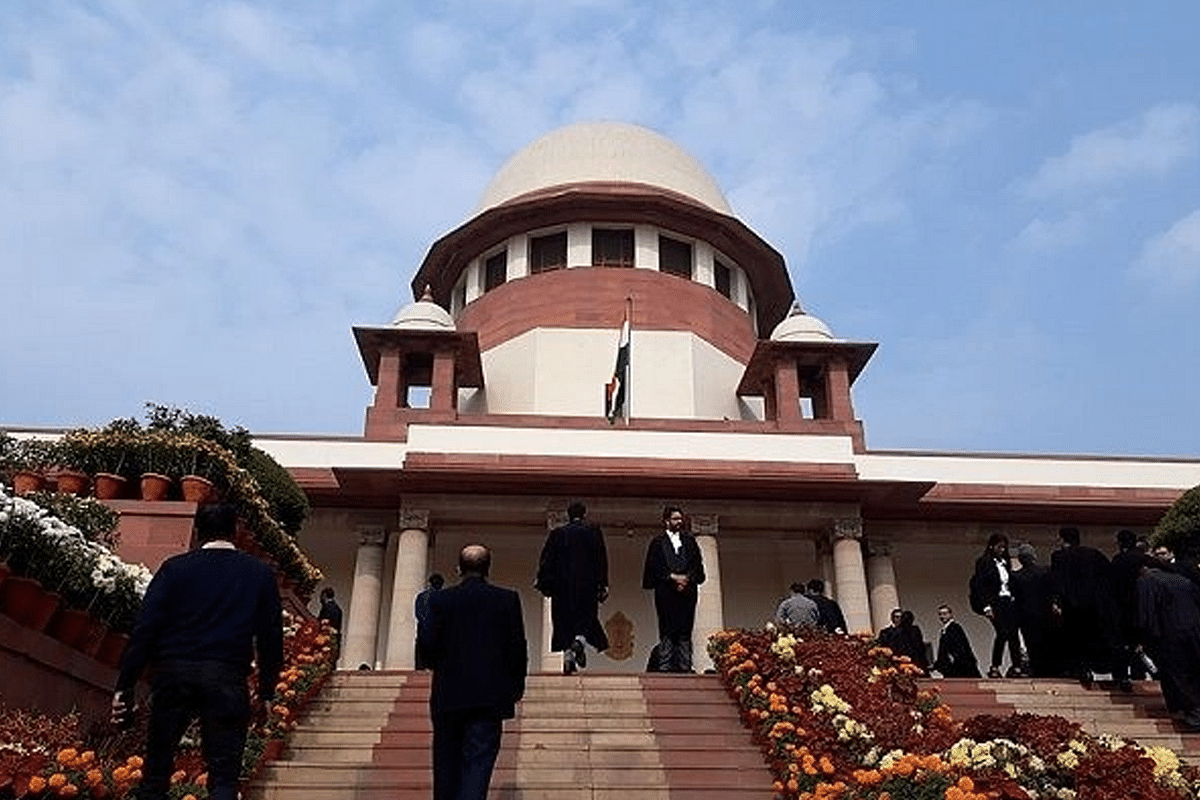News Brief
Supreme Court: Collegium System Is 'Law Of The Land', Certain Statements By Government 'Not Well Taken'

The Supreme Court of India. (Wikimedia Commons)
The Supreme Court in a contempt hearing over the issue of delays in appointments of ad hoc judges noted that the Collegium System is the law of the land and must be followed.
The SC bench, headed by Justice Sanjay Kishan Kaul, also accused the government of playing a game over the matter, and considered the government to be harping over an issue it already considered settled by a higher Constitutional Bench earlier.
The government has argued that the process of appointing ad-hoc judges in high courts, as per the Supreme Court's April 2021 judgment, will require changes to the Memorandum of Procedure-a document which guides appointment of judges to constitutional courts.
Additionally, the President cannot be bound to a timeline in matters of appointments.
The center has also submitted that the Law Ministry had previously sought the opinion of Chief Justice of India on the draft guidelines for the appointment of ad-hoc judges in an August 2021 letter, but the same is yet to be received a year on.
The bench in response noted yesterday (8 December) that while the government may suggest improvements on the MoP, any sweeping changes are no more possible.
The Court had previously passed a slew of guidelines in a April 2021 judgment over the appointment of ad hoc judges in the high courts, to tackle the backlog of cases and rising judicial vacancies.
In its judgment, the Court had sought to waive background checks in case of retired judges, but the Ministry in its letter has argued that since there is a gap between a judge's retirement and re-appointment, there should be a background check through IB.
The letter also asks the courts to develop a system to review the performance of ad-hoc judges.
Another point of contention is the removal of judges. While the procedure of removal of judges is provided for in the Constitution and the Judges Inquiry Act, 1968, the 2021 judgment pronounces that keeping ad-hoc judges wouldn't constrain or limit the regular processes, as it would only be transitionary.
The Ministry in its letter had subsequently asked for clarification over this.
The proposed guidelines do away with the time limit of three months for appointing ad-hoc judges, as laid down in the 2021 judgment, and do not propose any time limit in its place.
Also, the 2021 judgment had laid down the limit of 20 per cent of vacancies to trigger appointment of ad-hoc judges. The draft guidelines do away with this too and ask for recommendations for any and all vacancies that may arise in the next six months, before it seeks to engage ad-hoc judges.
The case has thus set the stage for another round of confrontation between the Judiciary and the Executive, who have been at loggerheads over the appointment of judges through the collegium system.
Justice Sanjay Kaul had also noted that the collegium system "is the law of the land" and "must be followed to the teeth". The government is free to bring in a new law to replace the collegium system, which could be put to test of constitutionality if challenged, he said.
It is to be noted that the Constitution nowhere provides for a collegium system, which was created through the Third Judges Case by the Supreme Court.
The court stressed yesterday that statements made by "certain government functionaries" is "not very well taken", and asked the Attorney General to advise them to exercise control.
Previously, Vice-President Jagdeep Dhankar in his maiden Rajya Sabha speech said that the judiciary has invalidated people's mandate by quashing National Judicial Appointments Commission (NJAC) Bill.
Support Swarajya's 50 Ground Reports Project & Sponsor A Story
Every general election Swarajya does a 50 ground reports project.
Aimed only at serious readers and those who appreciate the nuances of political undercurrents, the project provides a sense of India's electoral landscape. As you know, these reports are produced after considerable investment of travel, time and effort on the ground.
This time too we've kicked off the project in style and have covered over 30 constituencies already. If you're someone who appreciates such work and have enjoyed our coverage please consider sponsoring a ground report for just Rs 2999 to Rs 19,999 - it goes a long way in helping us produce more quality reportage.
You can also back this project by becoming a subscriber for as little as Rs 999 - so do click on this links and choose a plan that suits you and back us.
Click below to contribute.
Latest